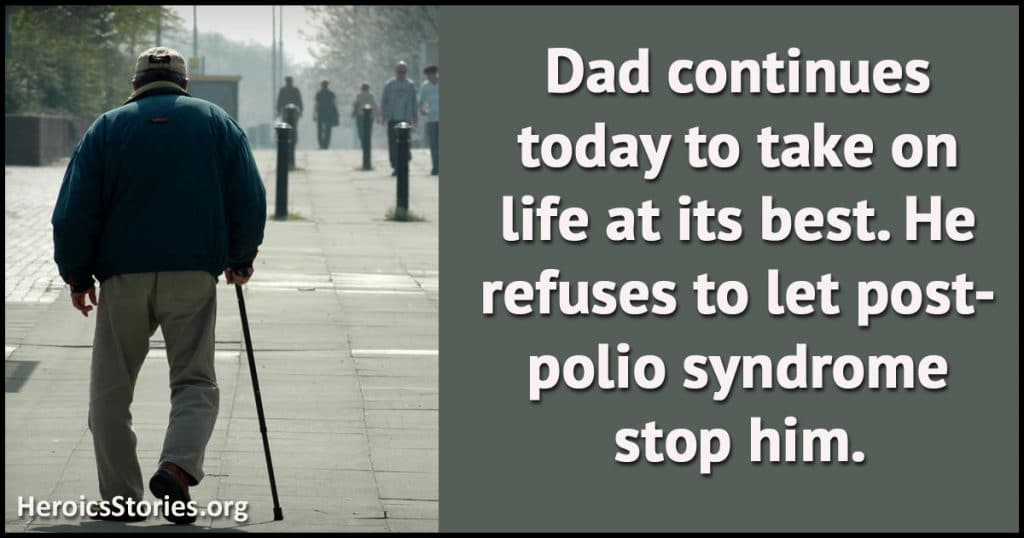by Pat Fridgen
Greencastle, Pennsylvania, USA

My father, Ted Nelson, has a disability. It was in front of me every day of my life growing up, but I never paid it any attention because he didn’t make a big deal out of it.
Sure, I knew he wore a brace on his leg, the result of infantile paralysis suffered as a toddler. I knew his shoe had an elevated heel because the atrophied calf muscle lifted his ankle off the ground. But Dad did what every other dad in the neighborhood did. He worked hard, he played golf, he went to meetings. He was a busy man. He never mentioned not being able to do something because of the effects of polio.
He got his positive attitude from his parents. When the physician in the late 1920s said little Ted would not walk again, they believed he would. They consulted a chiropractor and learned muscle-strengthening exercises, becoming, in effect, Ted’s physical therapists. Their optimism and diligence paid off. From then on, my dad led a pretty normal life. He had an active childhood, went to college to become a chiropractor, and devoted much time and effort to the Shriners, an organization that raises funds for children’s hospitals.
Dad’s “do it” attitude meant I was never embarrassed by the twist in his step. As a teen I realized I didn’t even consciously know which leg had been affected. I had to look at him and make a mental note — L=left=limp.
Only recently has he shared some stories from his younger years. When he encountered situations where his leg was an obstacle, he worked around it. In high school he went out for football. “I was an end,” he told a grandson. “I sat on the end of the bench and got water for everyone.”
He tried to enlist in the service during World War II. “I thought I could at least get a desk job,” he told the doc at the physical. “I can do something.” The physician looked at his leg, shook his head, and kicked him out of the office.
Dad continues today to take on life at its best. He refuses to let post-polio syndrome stop him. He is known as the “balloon man” by scores of children for the balloon animals he makes at charity functions. When he can’t walk a distance, he rides his bike. He won’t use just any old cane, but one he has carved himself. He has taught me, my siblings, and now his grandchildren that obstacles in life can be ignored, overcome, or dealt with in a humorous manner. He chooses to “do” when it would be so easy not to.
Available in The Best of HeroicStories, Volume 2.
Podcast: Play in new window | Download (Duration: 4:00 — 3.4MB)


Attitude is all. If you think you are a cripple, you are, If you have the attitude it is a hobby, you will do fine. The parent’s attitude is crucial in how the kid will turn out. When possible, the parents should ignore it && let the kid figure it out. (Note: this does not mean the parents should ignore real challenges, like bullying. In this case, the parents dealt with the real physical issues, but they allowed him to live as normal a life as possible.)
For those reading this && think I’m just making this up, or ignoring reality, i was born with half my left forearm. My parents *explicitly* ignored it. As a result, I have done more than most people && do anything I want, from sports to building things (like houses), to a career in engineering. I’m not claiming I’m special, just using my talents as everybody should.
My step-dad also had polio as a child and never let it stop him. He was unable to join the military, but he was able to take care of a kennel full of greyhound dogs and travel the country racing them. He taught me much, but the greatest piece of advice he gave me was: Your Word – If you don’t have your word, you have nothing. Stated another way, If you word means nothing then you mean nothing!! Thank you, dad for all you taught me growing up!!